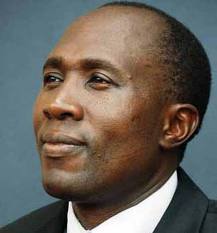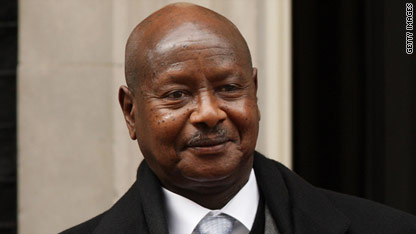When Beatrice Atim Anywar received a call from a reporter to ask if her daughter had applied for a scholarship with an oil company, she laughed. “ I had no idea,” she said. At over six feet Anywar has a reputation as a fighter. She earned most of her stripes as “Mama Mabira”, the face of the 2007 campaign to save one of Uganda’s best-known natural rain forests. At the time she was asked to respond to the question about her daughter and a scholarship being offered the French company Total she held the portfolio as Minister for Natural Resources in the Opposition shadow cabinet. Her daughter she later said was not awarded the chance to study the oil and gas sector. The intercourse between Parliament and the oil companies is so far arms length.
During the oil debate in November 2011, the House was piqued by an incident in which a letter written to the Speaker Rebecca Kadaga in defense of Tullow Oil was presented on the floor by the Prime Minister Amama Mbabazi before she could open hers. The sense that it is the government and the oil companies in a tight embrace, working hand in glove, explains the attitude of mistrust that ordinary Mps feel.
In the last seven days battle lines will be drawn. In a rather bizarre commentary on the distance ordinary Ugandans may feel from the process, an NGO alliance led by Advocates Coalition for Development and Environment (ACODE)invited all Uganda’s 370 Mps, including Mama Mabira to the lakeside resort of Munyonyo to debate amendments to the country’s proposed oil bills. She could not make the date but for a burial she was attending to in Northern Uganda.On Monday October 29th, the ruling party has summoned its members, which form a majority to do the same. Thus in a space of a few days two almost full plenaries (about 220 Mps attended the Munyonyo affair) will meet outside the ordinary sitting of the House to lock horns on the bills. One facilitated by donors and civil society and the other by a government embattled by its record on transparency on oil as well as a continuous scandal over public finances.
An NGO lawyer said a junior government minister had remarked that the party caucus was meant to “detoxicate” what NGO’s want the bills to reflect.
At the center of the debate, when it commences, will be how much power the government will have over the oil sector through the institutions the law will raise, but more so what sort of Ugandan National Oil Company will come to define the domestic industry.
“ That is the beef,” says Hon Theodore Ssekikubo, who heads the Parliamentary Forum for Oil and Gas [PFOG]. The National Oil Company or NOC is the entity that will receive Uganda’s share of oil from the oil companies and trade in it. As the company, which carries Uganda’s participating interest in the oil, sectors it will be a highly profitable company, holding acreage and eventually being groomed to compete with international oil firms.
For example last week the Kanywataba Exploration area of Block 3A in the southern part of Lake Albert reverted to government. Some work had been done in the area, which has real potential. Tullow in fact had applied for an extension of its exploration license arguing force majeure after its drilling rigs got damaged at sea and delayed its appraisal some of its properties. However in a statement the Petroleum Exploration and Production Department of the energy ministry said the area would now be licensed under the new law. Theoretically if Uganda had an existing NOC this acreage would now constitute a part of its assets and may yet still.
In the weeks preceding weeks Mr. Ssekikubo and others have said the government through the Energy Minister Irene Muloni and her Permanent Secretary Kabagambe Kaliisa have gone on a charm offensive over the nature of the NOC. “ They want to create a national oil company under the Companies Act, which will effectively make it a private affair beyond the reach of Parliament,” he added. Other member of the Parliamentary Committee on Natural Resources say they have been herded into hotels and resorts and leaned on to support a private sector NOC, which while fully owned by the government, can easily divest shares to private individuals and companies. A meeting with the Ugandan President Yoweri Museveni was also held. He seems to favor a statutory corporation over the choices of his technical advisors.
In one recent lobbying effort a team of justice and energy officials met the committee in Lweza. “ The Minister told me they will fight this one. At least you should give us 10% of the company,” said one committee member of condition of anonymity. “ I can never be a party to allowing a few privileged Ugandans to buy shares and thereby privately own these national assets,” Ssekikubo thundered in a preparatory meeting of like-minded Mps backed by civil society technocrats. Last week PFOG launched its own lobbying effort. It was the main engine for the invitation of the entire House to Speke Resort Munyonyo to “harmonize” their position on contentious matters in the oil bills which largely revolve around the powers of the government through the Minister to act as the C.E.O of the industry as well as how open the sector will be. The group, which includes House members on the natural resource committee from various parties, want a fully state owned statutory company and not a private one from the start.
They also want to prevent the NOC from ceding shares in the guise of raising capital for its activities. In the discussion about the merits of a statutory national oil company versus a private one many Mps recall Uganda’s experience with privatization in the 90’s. The political message was that the process was rigged by privileged politicians and their associates who grew privately grew wealthy by gobbling up state enterprises derided as badly managed assets from the era when the state directly run businesses and enterprises. “ We have seen what has happened with National Housing and National Insurance Corporation amongst others” Ssekikubo told the group. “What starts out as partial privatization ends up as complete handover”.
Recent controversies in government processes have not helped the mood around how Uganda’s NOC will be birthed. The handling of Karuma Power Dam project in which a few Chinese firms with state connections elbowed to the front or even how the provident fund National Social Security Fund that is supervised by the Minister of Finance has gone about its investments. Last week another scandal this time involving the privatization of Uganda’s best-known copper mine, Kilembe Mines was also emerging. Sources said tension had gripped the process as top decision makers wanted to abandon competitive bidding in favor of a direct award to yet another Chinese firm. Thus with political interference and a checkered record of “ broad daylight thieving”, the issue of what sort NOC carries the hopes of Ugandans will likely dominate debate in the House. Some Mps have said even the current language of compromise in which a private company is held 100% by the government and prevented from selling its shares for a period is too risky. It has not helped that since Uganda discovered oil in 2007 (3.5 billion barrels so far) the relationship between Ugandan companies and the oil companies has remained opaque. James Karama who coordinates strategy for oil and gas at Stanbic Bank says the lack of demand forecasting in which the requirements of the sector are made readily available has limited access to the sector. It has also allowed an attitude of familiarity to creep in the culture of the companies.
In 2010 Tullow briefly lost its license to Block 3A for not filing for an extension on time. In recent days Tullow has again run into trouble over its profile of recoverable expenses. After entering a 5-year tenancy agreement valued at a million dollars annually for a building on Plot 9 Yusuf Lule Road it has had to terminate its contract controversially.
In an email Ms Cathy Adengo, its communications officer said the exit from the building was for technical reasons. However sources familiar with the events report that Tullow had not properly vetted the building and that an industry consulting engineering group MBW had provided incomplete data about the suitability of the building. Now after receiving approval from PEPD to spend 6.5 million dollars in outfitting it for habitation the company in trouble on whether it can recover those expenses. The matter is headed for litigation those in the know say. Some of the laxity appears premised on Tullow’s political relationships and not necessarily its commercial interests or legal obligations. The mood in the sector is one of inertia as the process of lawmaking as well as the insistence by the government that the companies participate in building a refinery has slowed down the development phase of the industry.
Tullow particularly is hard hit.
Unlike the other two giants, Total and CNOOC, it cannot draw on economies of scale to sit through more delays. In hushed tones its executives complain about lack of cooperation from its partner the government. “We cannot agree on anything” one senior official said. Internal discussions on contingency exit plans from Uganda are being mooted said another, if oil does not leave the ground to make the project commercially viable. The company is looking east, it’s officials say, and beyond toward other finds in the region. But with a bonanza of oil, gas and minerals, Uganda’s legislative gymnastics may cause delays but not slow down interest in her natural resource sector. It’s against this background that this week’s debate on regulation will take shape especially on how a Ugandan NOC will eventually emerge.










